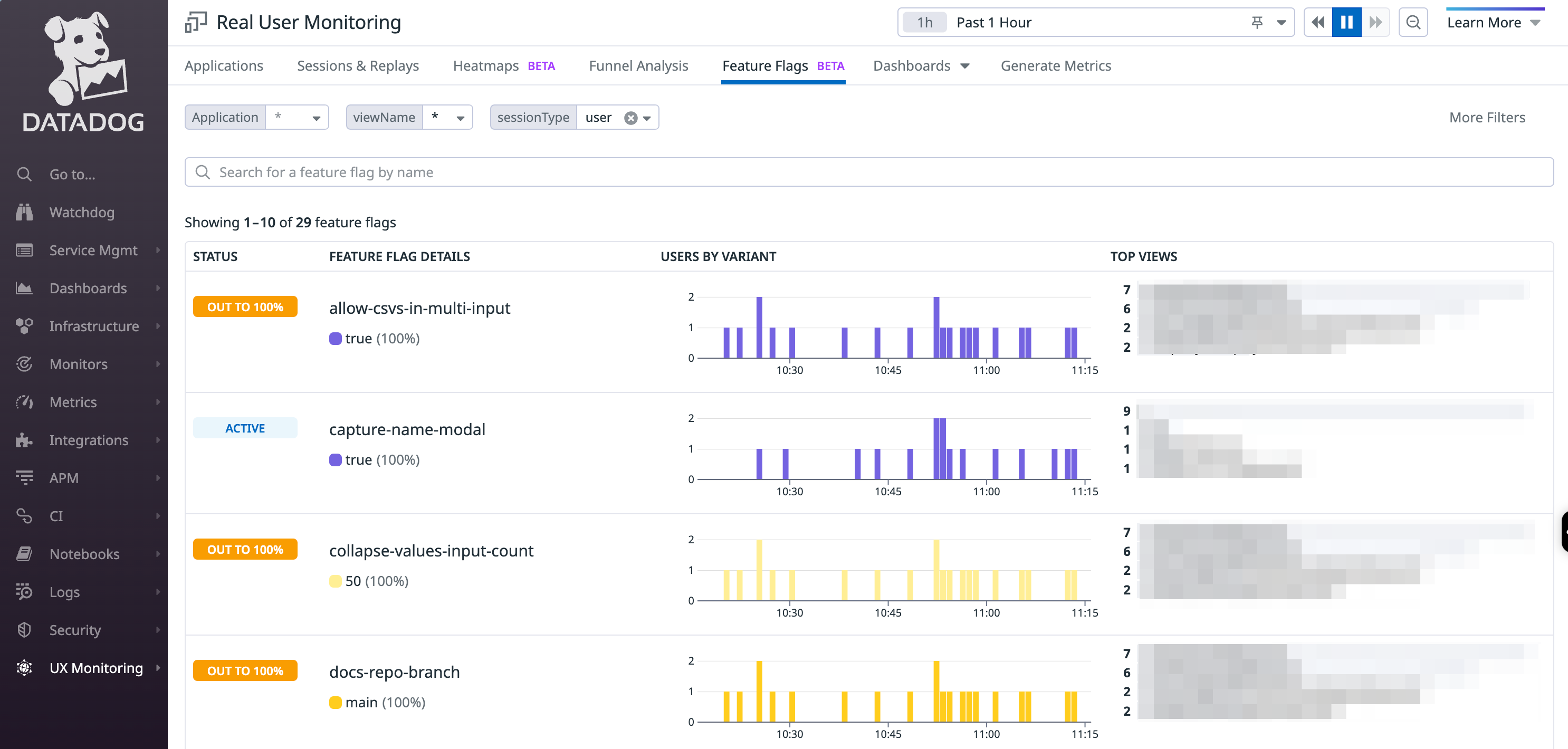DataDog
DevCycle's clientside Javascript SDKs - including JS and React, can now be easily integrated with DataDog RUM Feature Flag Tracking - enabling the enrichment of your RUM data with DevCycle's variable data.

Table of Contents
Configuration
Tracking variable evaluations with DataDog RUM is very simple, requiring only two steps.
- Enable the experimental feature in your
datadogRum.initconfiguration
datadogRum.init({
...
enableExperimentalFeatures: ["feature_flags"],
...
});
- Call
datadogRum.addFeatureFlagEvaluation(key, value)whenever a variable is evaluated. Since the JavaScript and React SDKs emit an event on every variable evaluation, this code should run within the subscription callback.
See below for more specific examples:
JavaScript
To track all variable evaluations:
const user = { user_id: "my_user" };
const devcycleOptions = { logLevel: "debug" };
const devcycleClient = initialize("<DEVCYCLE_CLIENT_SDK_KEY>", user, devcycleOptions);
...
devcycleClient.subscribe(
"variableEvaluted:*",
(key, variable) => {
datadogRum.addFeatureFlagEvaluation(key, variable.value);
}
)
To track a specific variable evaluation (in this case a variable whose key is my-variable-key):
const user = { user_id: "my_user" };
const devcycleOptions = { logLevel: "debug" };
const devcycleClient = initialize("<DEVCYCLE_CLIENT_SDK_KEY>", user, devcycleOptions);
...
devcycleClient.subscribe(
"variableEvaluted:my-variable-key",
(key, variable) => {
datadogRum.addFeatureFlagEvaluation(key, variable.value);
}
)
React
We recommend encapsulating your RUM code within a React hook, so consider the following example:
import { datadogRum } from '@datadog/browser-rum'
import { DVCVariableValue, useDevCycleClient } from '@devcycle/react-client-sdk'
import { DVCVariable } from '@devcycle/js-client-sdk'
let didInit = false
export const useDatadogRum = () => {
const devcycleClient = useDevCycleClient()
if (!didInit) {
didInit = true
datadogRum.init({
...
})
datadogRum.startSessionReplayRecording()
devcycleClient.subscribe(
'variableEvaluated:*',
(key, variable) => {
datadogRum.addFeatureFlagEvaluation(key, variable.value)
},
)
}
}
export default useDatadogRum
Then simply call the hook from your root component:
export const App = () => {
useDatadogRum()
...
return (
...
)
}
Coming Soon
DevCycle plans to release similar updates for both iOS and Android.
Contributing to DevCycle or creating a new Integration:
If you would like to contribute to an existing integration or tool, all of DevCycle's tools and integrations are open source on the DevCycle github repository.
Further, if you'd like to create a new tool or integration, a great starting point is DevCycle's Management API which allows you to modify and interact with features and more within a devcycle project, as well as the DevCycle Bucketing API which is used to give users features and variables (as used within the DevCycle SDKs!)